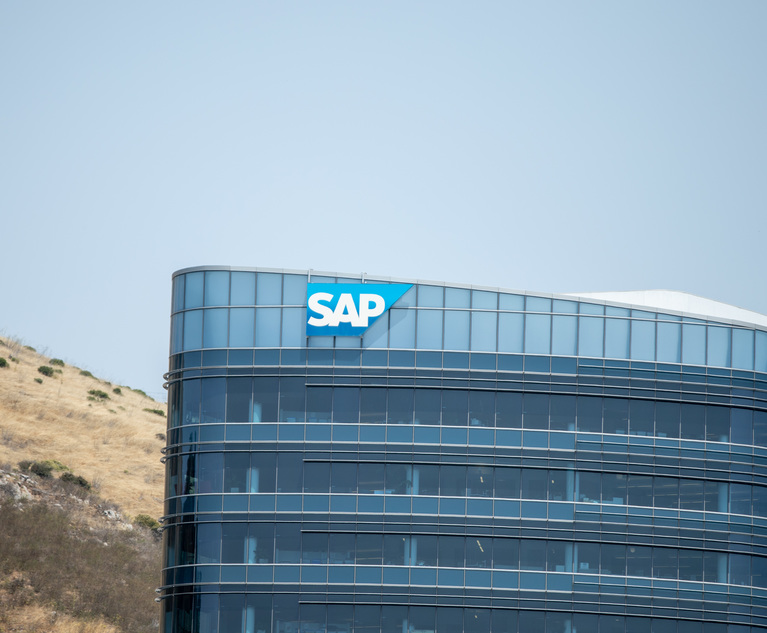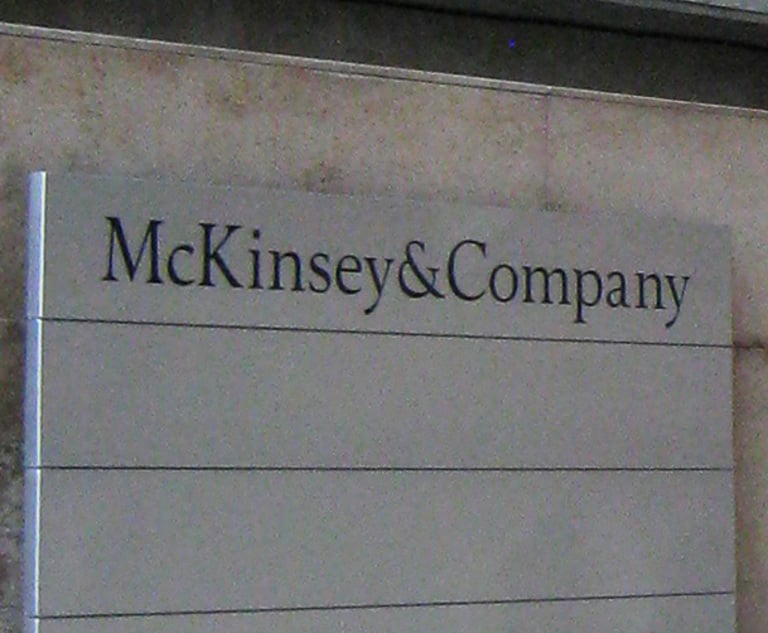Paul Hastings, Baker McKenzie Advise as IT Giant Reaches $220M Corruption Charges Settlement
The settlement deal will see SAP pay over $220 million in penalties and disgorgement payments to the US and South African authorities.
January 16, 2024 at 06:26 AM
4 minute read
 SAP office located at 1 Tower Pl #1100, South San Francisco. (Photo: Jason Doiy/ALM)
SAP office located at 1 Tower Pl #1100, South San Francisco. (Photo: Jason Doiy/ALM)
Multinational software company SAP and its subsidiaries will not be facing criminal prosecution for their alleged involvement in multiple bribery schemes, according to details of a recent settlement deal the company struck with the United States authorities.
The processes that culminated in the resolution involved lawyers from Baker McKenzie and Paul Hastings, which were engaged by SAP at different times, Law.com International gathered.
The technology company, which is listed on the New York Stock Exchange, was implicated for paying bribes to clinch deals and obtain improper business advantage in companies and state-owned firms across different countries.
"From at least December 2014 through December 2018, SAP employed third-party intermediaries and consultants in various schemes to make improper payments to government officials in order to obtain and retain business in South Africa, Greater Africa (Malawi, Kenya, Tanzania, and Ghana), and Indonesia," the U.S. Securities and Exchange Commission (SEC) stated in a court filing.
The practices uncovered violated the U.S. anti-bribery, books and records, and internal accounting controls provisions of the Foreign Corrupt Practices Act (FCPA), the agency said.
But now, the authorities will not be pressing charges as the long-running probe will end in a settlement deal that will see SAP part with over $220 million in penalties and disgorgement payments to the U.S. and South African authorities.
SAP had also entered into a three-year Deferred Prosecution Agreement (DPA) with the agencies, protecting the company and its subsidiaries from prosecution on matters relating to the bribery investigation.
The Department of Justice (DoJ), in a statement released on Thursday, said; "Pursuant to the DPA, SAP will pay a criminal penalty of $118.8 million and administrative forfeiture of $103,396,765. SAP will also continue cooperating with the department in any ongoing or future criminal investigation arising during the term of the DPA."
"In addition, the department will credit up to $55.1 million of the criminal penalty against amounts that SAP pays to resolve an investigation by law enforcement authorities in South Africa for related conduct."
Acting assistant attorney general Nicole Argentieri of the DoJ's criminal division said the resolution with SAP demonstrates how "corporate enforcement policies incentivise companies to be good corporate citizens".
SAP, in its reaction to the deal, claimed the full resolution was due to its "significant remediation efforts" and cooperation with the authorities.
"As noted in the settlement agreements, SAP conducted a thorough and extensive investigation into historical misconduct and fully cooperated with the authorities."
When the news of the bribery scandal broke in 2017, SAP engaged Baker McKenzie as an external investigator. Although the company said the investigation found no evidence of payments to government officials or private companies in South Africa, it uncovered "indications of misconduct".
Meanwhile, specifics of Baker McKenzie's involvement in the case after the 2017 investigation remain unclear and it declined comment for this story, but SAP had earlier said the law firm was in regular communication with the authorities on its behalf.
For the settlement agreement with the DoJ, Paul Hastings' partners in Washington DC; global co-chair of litigation, Kwame Manley and two others on the White Collar Defense practice, Robert Luskin and Jason Fiebig acted for SAP.
Paul Hastings spokesperson confirmed the involvement of the partners but said the firm would not comment on the case.
This is not the first time Paul Hastings has guided SAP in settlements that could have resulted in prosecution.
In 2021, the duo of Manley and Luskin acted for the company when it signed a Non-Prosecution Agreement (NPA) with the Justice Department after admitting that it violated the U.S. Export Administration Regulations and the Iranian Transactions and Sanctions Regulations.
The company, as part of the agreement, paid combined penalties of more than $8 million to the authorities and remediation costs of more than $27 million.
This content has been archived. It is available through our partners, LexisNexis® and Bloomberg Law.
To view this content, please continue to their sites.
Not a Lexis Subscriber?
Subscribe Now
Not a Bloomberg Law Subscriber?
Subscribe Now
NOT FOR REPRINT
© 2025 ALM Global, LLC, All Rights Reserved. Request academic re-use from www.copyright.com. All other uses, submit a request to [email protected]. For more information visit Asset & Logo Licensing.
You Might Like
View All

McKinsey Subsidiary to Pay Over $122 Million to Settle US Investigation into South Africa Bribery Case

Ex-Dewey & LeBoeuf Banking Lawyer on Trial in Germany’s Cum-Ex Tax Scandal

Indian Billionaire Gautam Adani Indicted in US for Alleged Orchestration of $250 Million Bribery Plot
3 minute readLaw Firms Mentioned
Trending Stories
Who Got The Work
J. Brugh Lower of Gibbons has entered an appearance for industrial equipment supplier Devco Corporation in a pending trademark infringement lawsuit. The suit, accusing the defendant of selling knock-off Graco products, was filed Dec. 18 in New Jersey District Court by Rivkin Radler on behalf of Graco Inc. and Graco Minnesota. The case, assigned to U.S. District Judge Zahid N. Quraishi, is 3:24-cv-11294, Graco Inc. et al v. Devco Corporation.
Who Got The Work
Rebecca Maller-Stein and Kent A. Yalowitz of Arnold & Porter Kaye Scholer have entered their appearances for Hanaco Venture Capital and its executives, Lior Prosor and David Frankel, in a pending securities lawsuit. The action, filed on Dec. 24 in New York Southern District Court by Zell, Aron & Co. on behalf of Goldeneye Advisors, accuses the defendants of negligently and fraudulently managing the plaintiff's $1 million investment. The case, assigned to U.S. District Judge Vernon S. Broderick, is 1:24-cv-09918, Goldeneye Advisors, LLC v. Hanaco Venture Capital, Ltd. et al.
Who Got The Work
Attorneys from A&O Shearman has stepped in as defense counsel for Toronto-Dominion Bank and other defendants in a pending securities class action. The suit, filed Dec. 11 in New York Southern District Court by Bleichmar Fonti & Auld, accuses the defendants of concealing the bank's 'pervasive' deficiencies in regards to its compliance with the Bank Secrecy Act and the quality of its anti-money laundering controls. The case, assigned to U.S. District Judge Arun Subramanian, is 1:24-cv-09445, Gonzalez v. The Toronto-Dominion Bank et al.
Who Got The Work
Crown Castle International, a Pennsylvania company providing shared communications infrastructure, has turned to Luke D. Wolf of Gordon Rees Scully Mansukhani to fend off a pending breach-of-contract lawsuit. The court action, filed Nov. 25 in Michigan Eastern District Court by Hooper Hathaway PC on behalf of The Town Residences LLC, accuses Crown Castle of failing to transfer approximately $30,000 in utility payments from T-Mobile in breach of a roof-top lease and assignment agreement. The case, assigned to U.S. District Judge Susan K. Declercq, is 2:24-cv-13131, The Town Residences LLC v. T-Mobile US, Inc. et al.
Who Got The Work
Wilfred P. Coronato and Daniel M. Schwartz of McCarter & English have stepped in as defense counsel to Electrolux Home Products Inc. in a pending product liability lawsuit. The court action, filed Nov. 26 in New York Eastern District Court by Poulos Lopiccolo PC and Nagel Rice LLP on behalf of David Stern, alleges that the defendant's refrigerators’ drawers and shelving repeatedly break and fall apart within months after purchase. The case, assigned to U.S. District Judge Joan M. Azrack, is 2:24-cv-08204, Stern v. Electrolux Home Products, Inc.
Featured Firms
Law Offices of Gary Martin Hays & Associates, P.C.
(470) 294-1674
Law Offices of Mark E. Salomone
(857) 444-6468
Smith & Hassler
(713) 739-1250








